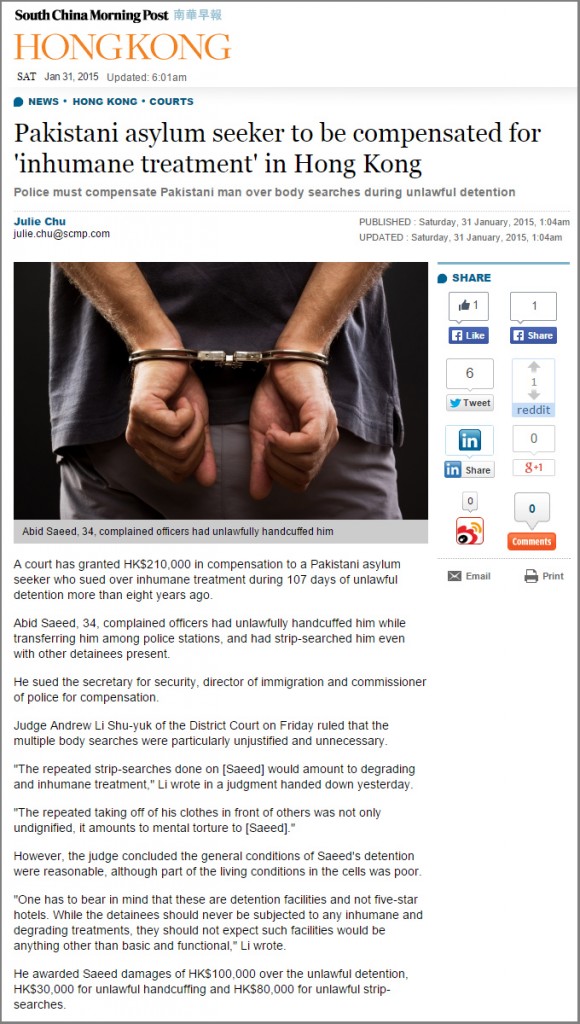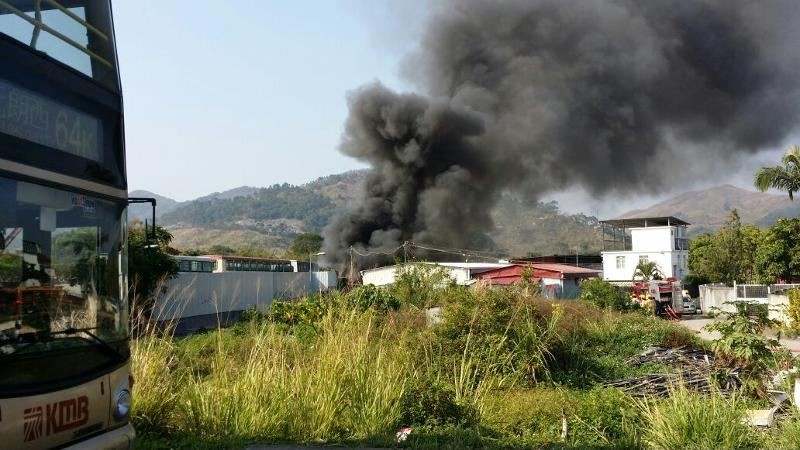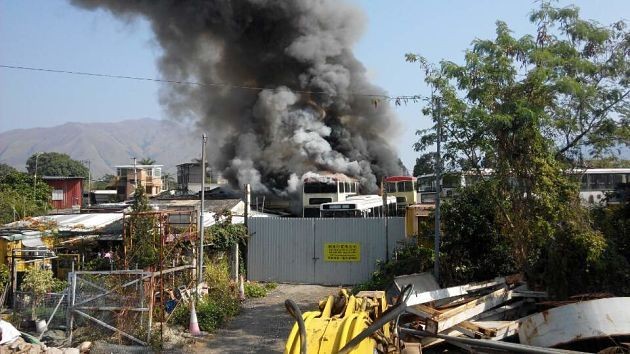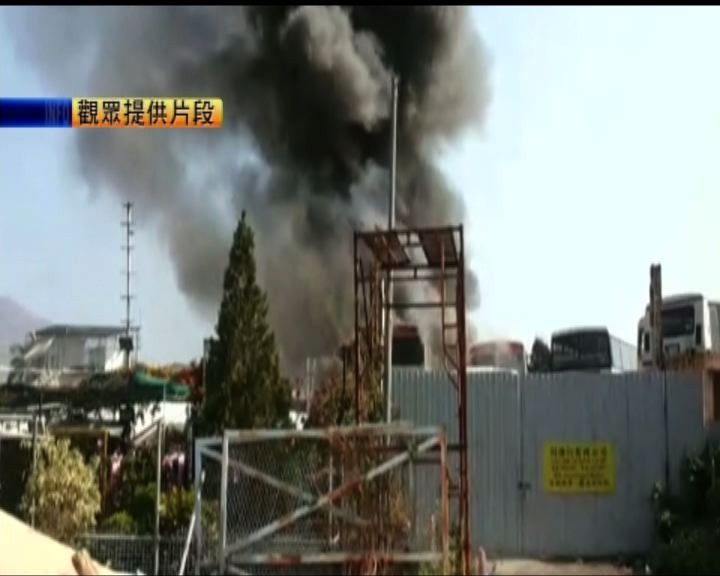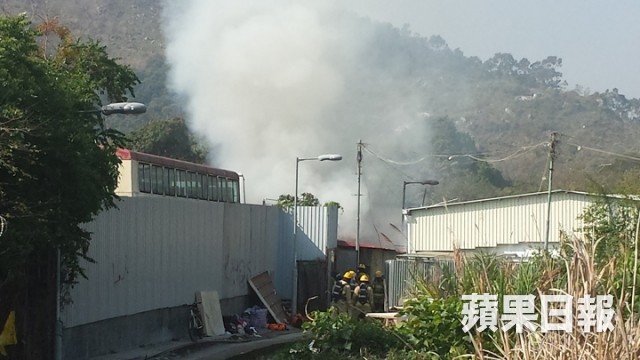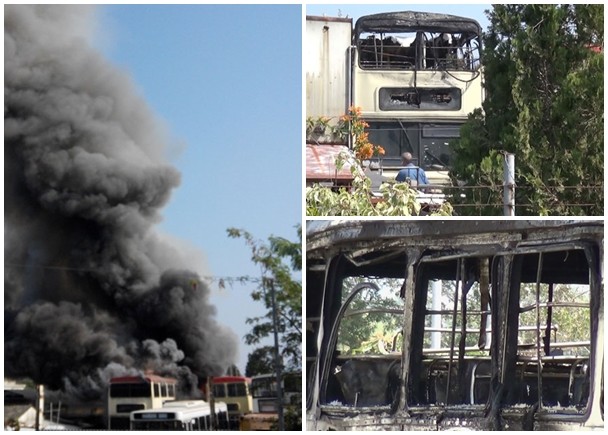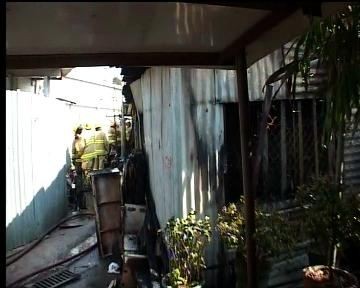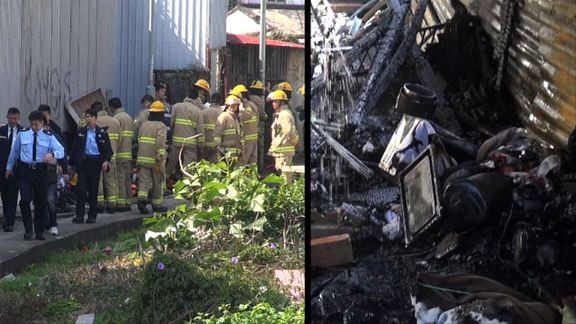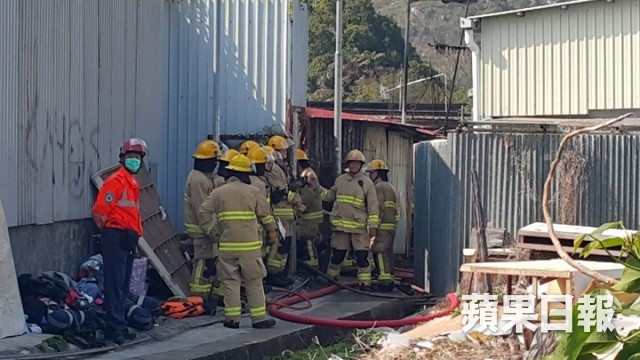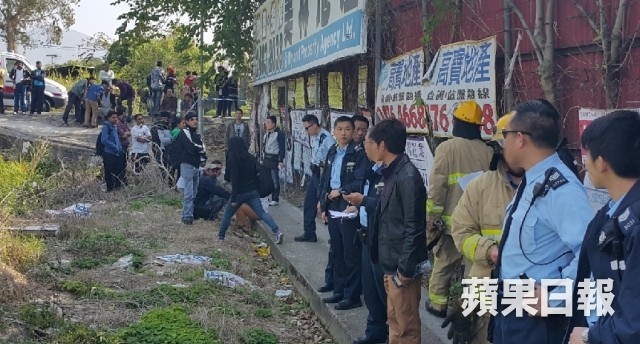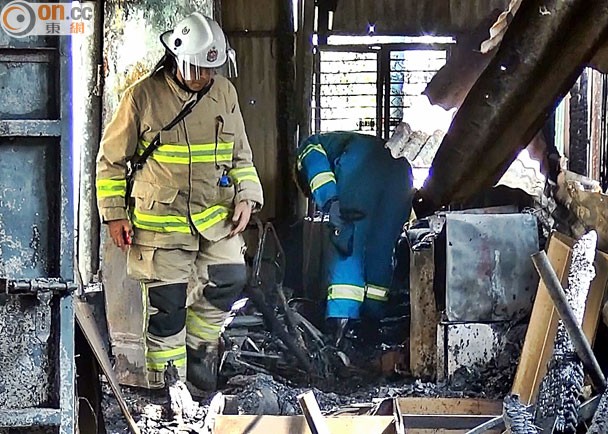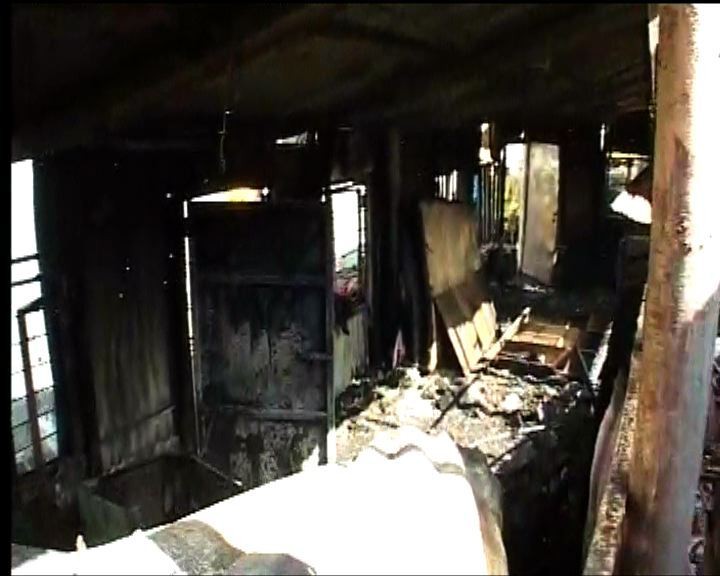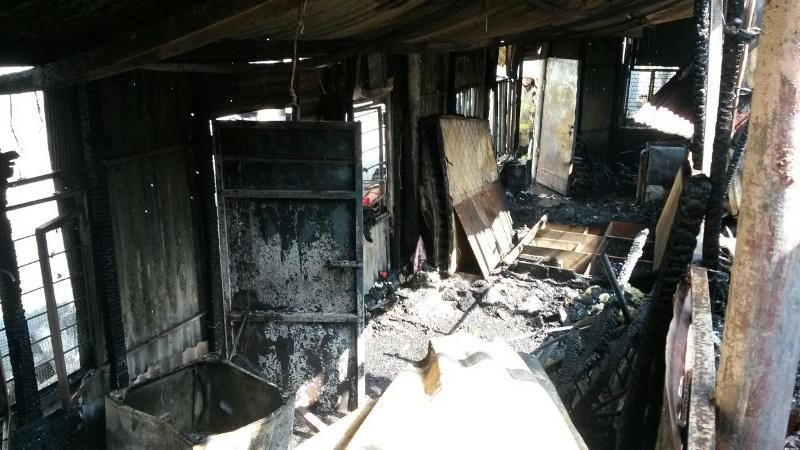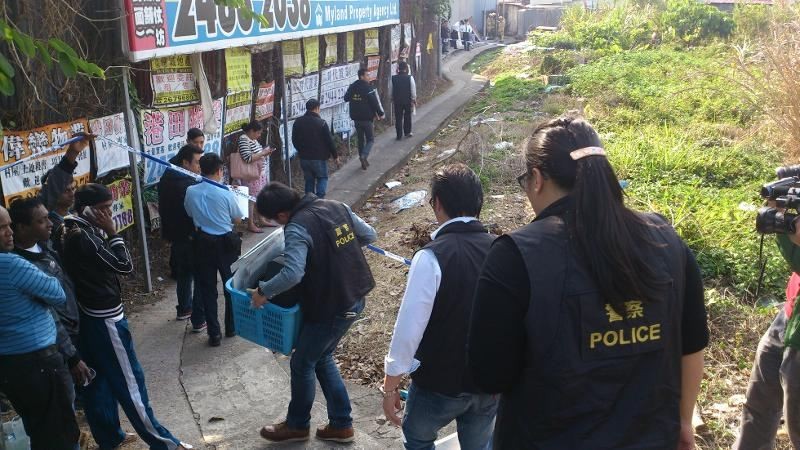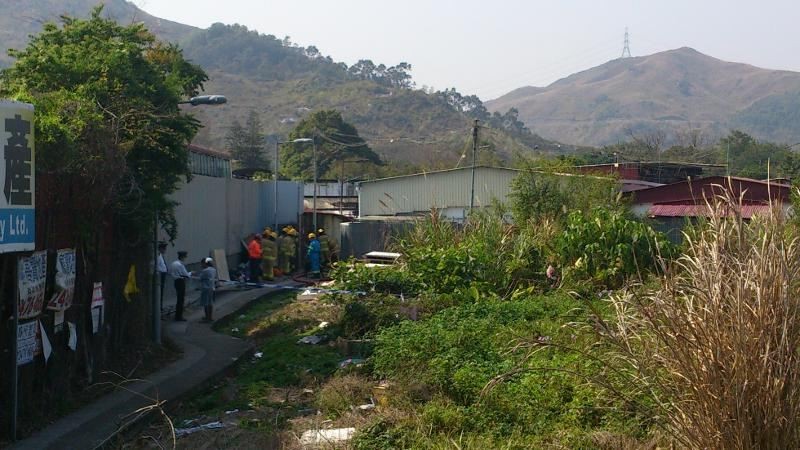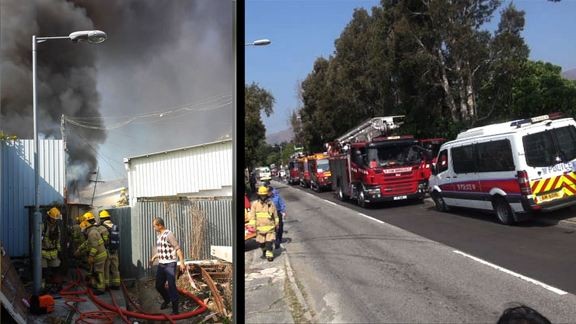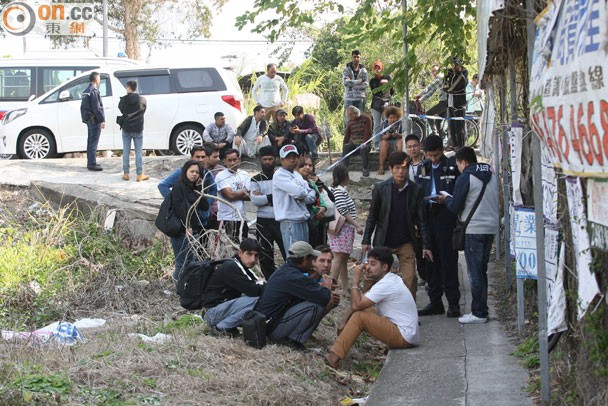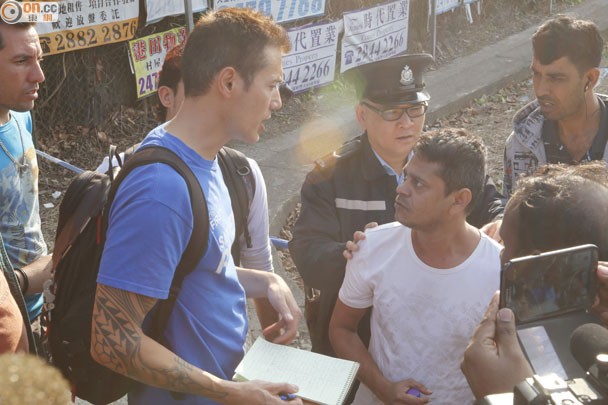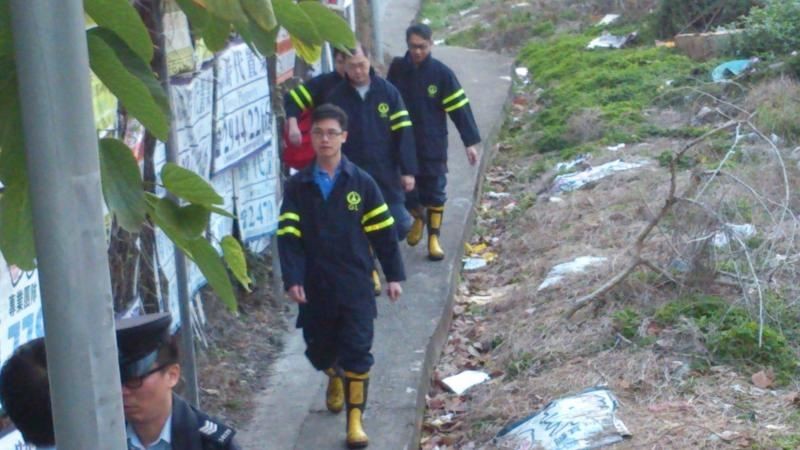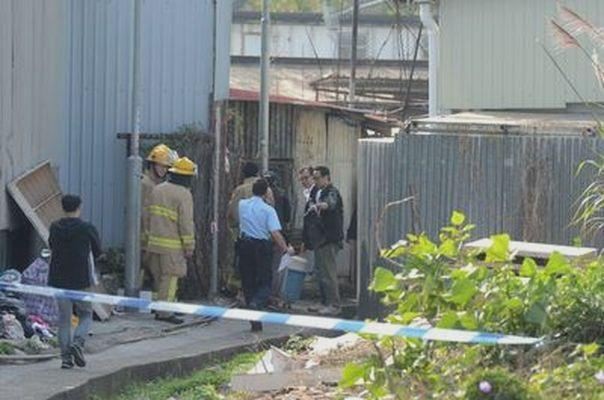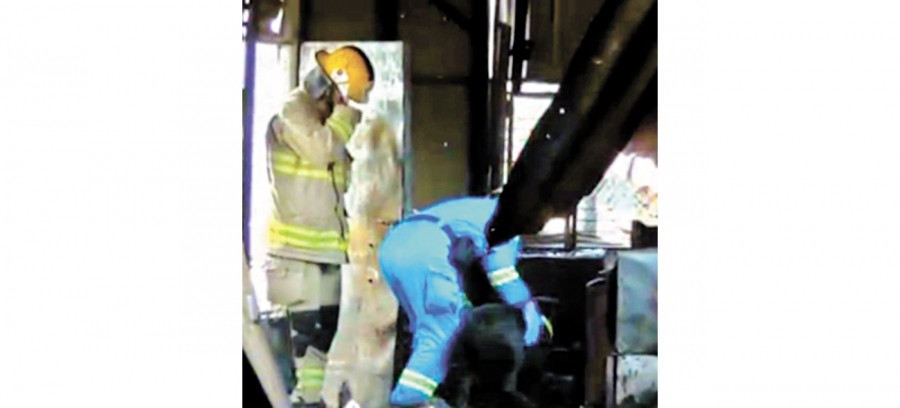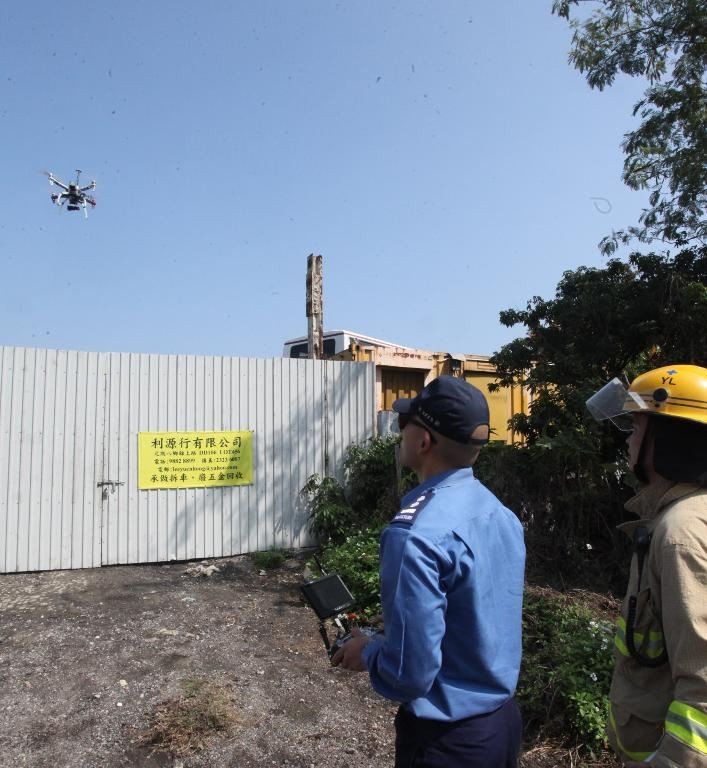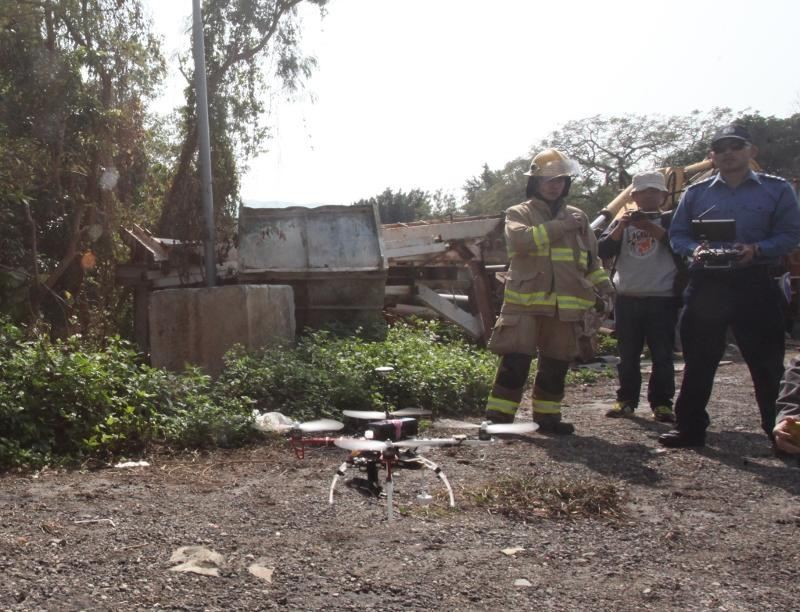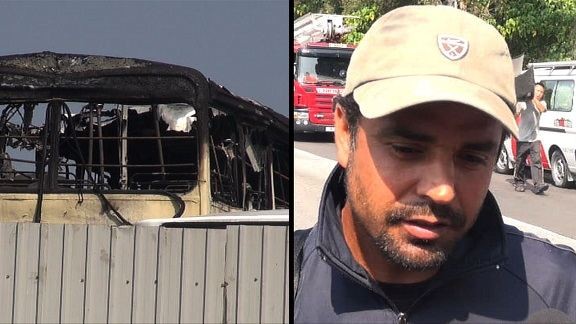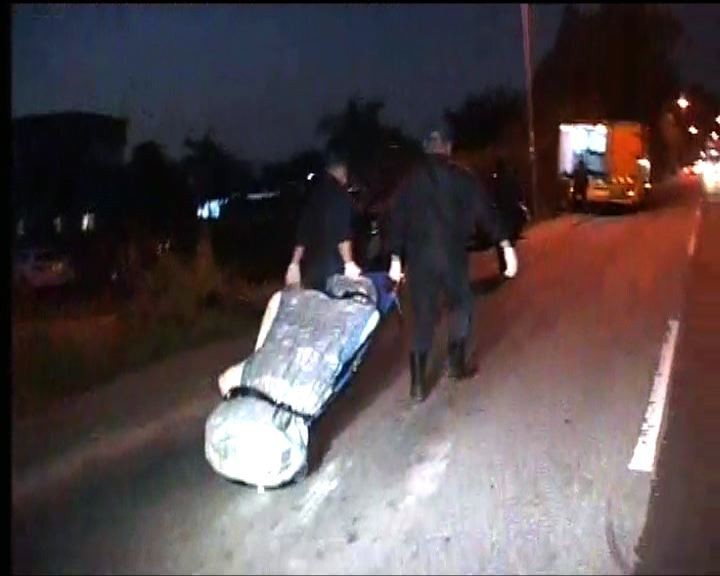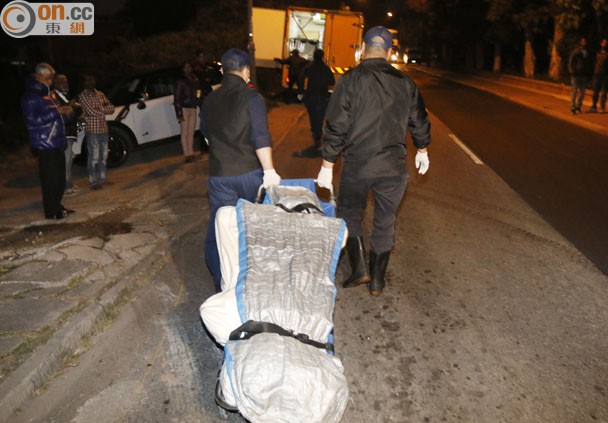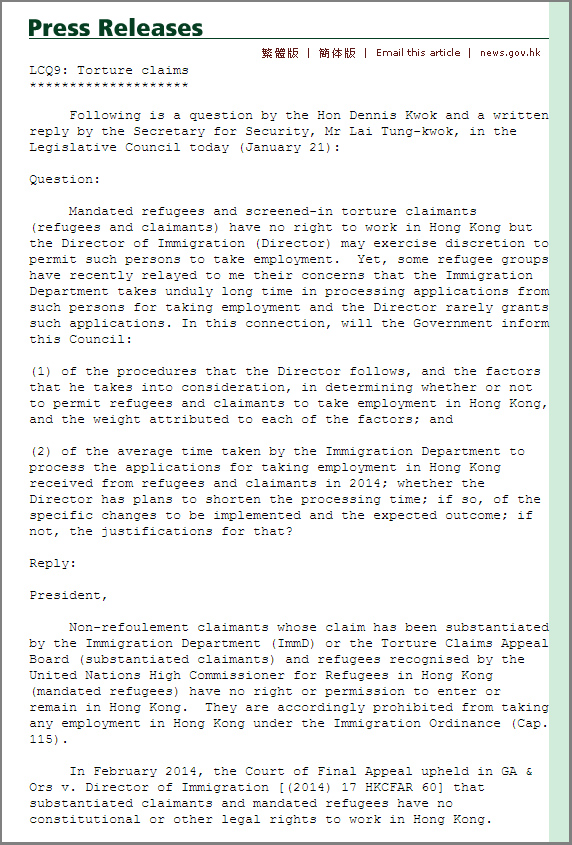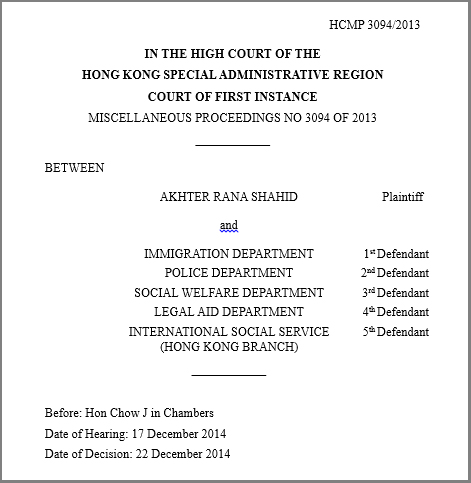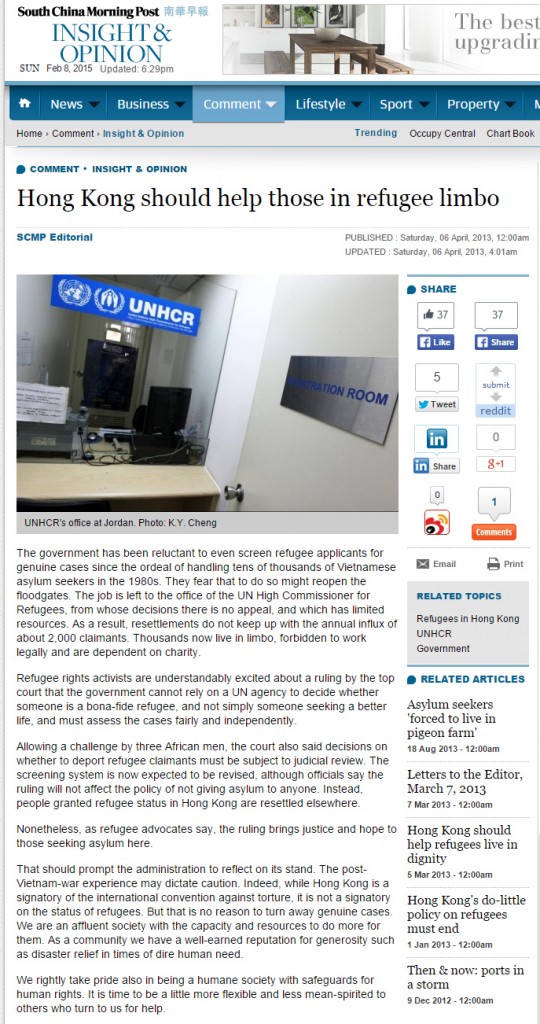Pakistani asylum seeker to be compensated for ‘inhumane treatment’ in Hong Kong
Jan 31st, 2015 | Crime, Legal, Media | Comment
Who is responsible for Lucky’s death?
Jan 30th, 2015 | Crime, Housing, Legal, VF Opinion, Welfare | Comment
Vision First exposed ‘The Slum On Two Storeys’ in August 2013 when we reported that an unscrupulous owner constructed a dangerous dormitory on two levels, where ISS-HK colluded to settle over 25 refugees. Evidence revealed that the Lands Department once authorized the construction of three pigsty and two chicken sheds on the lot, though licenses had been revoked.
A year and a half later only the names of some of the refugee tenants had changed as new-arrivals moved in. No government department seemed interested to address the problem of illegal structures that, in our view, constituted veritable ‘death traps’ owing to overcrowding, substandard construction, illegal electrical wiring, gas cooking in confined spaces and alarmingly a lack of firefighting equipment.
In a 28 January 2015 meeting, we brought to the attention of Lands Department officers that the slums generally constituted a fire hazard and it was only a matter of time before one would go up in flame, possibly with loss of human life. We remarked that the Fire Services Department had seen the photos of the slums and were keen to take coordinate action with SWD and Lands.
One day later we received an SMS from a Bangladeshi member, “Kam Sheung Road have refugee house burning. One man die just before”. The Refugee Union swung into action and photos spread on social media a few minutes later. A violent fire was raged out of control. Firemen from 18 trucks with two breathing apparatus team took 40 minutes to douse the inferno. Too late for Lucky!
He was known by the nickname “Lucky”, which didn’t protect him as he burnt to death in a tin shed. Lucky often complained about faulty electrical wire that gave shocks. It is reported that his ISS case worker visited his shack and looked into the problem a few days earlier. A friend explained that refugees often wire the slums with two-face system that can short-circuit and catch fire.
Vision First was familiar with Lucky’s hut and the others lining the path to the ‘Slum on Two Levels’. There was nothing legal there. Every part and material raised alarming concerns. In the slums there is imminent danger of collapse, flooding, gas explosion, lightning strikes and – most frightening – FIRE! Had it been nighttime with most residents at home sleeping, the death toll would have been high.
We can only hope that Lucky’s tragic death will not have been in vein. It was disappointing to witness the sudden media frenzy drawn by the excitement of a raging fire and a gruesome death. Why were the refugee slums not newsworthy yesterday? Why did it take a death to draw media and public interest? Lucky’s death was entirely avoidable if the authorities had taken action in August 2013.
VF Report: lease enforcement action to be stepped up
Jan 29th, 2015 | Crime, Housing, Legal, VF Report, Welfare | Comment
On 28 January 2014 senior executives from the Lands Department held a meeting with Vision First and Refugee Union representatives, one of whom has continuously resided in a slums paid for with government funds since he arrived in 2006.
The refugees presented three voluminous bundles of photographic evidence to formally lodge complaints on 69 questionable compounds erected on lots that Lands officers agreed were “mostly for agricultural use, including chicken and pig licenses no longer in use, because the government doesn’t allow [such business] having imposed many restrictions on farmers.”
The delegation was assured that registered owners were in breach of lease covenants for any structures that were not exclusively for agricultural or gardening use. It was brought to attention that the issue is not whether housing was properly constructed, but that no housing whatsoever is permitted on farmland and as such would be targeted for demolition.
It was noted that irrespective of collusion (by way of documentary inspections and site visits), registered owners were ultimately responsible for the existence of structures that third parties allegedly exploited to profit from the welfare program for refugees. The Lands Department did not consider acceptable justifications that ‘primary tenants’ had rented land for purposes landlords were unaware of.
Acting on the above mentioned complaints, warning letters demanding the removal or demolition of unauthorized structures are likely to be sent out copiously, failing which encumbrances will be registered with the Lands Registry and the government will take steps to ‘re-enter the land’.
A promise was made for zero tolerance of lease breaches. An officer explained, “Any conversions that are not designated for agricultural or gardening use are prohibited. Any structures that are not described in the land schedule must be removed”. It was categorically emphasized that settling refugees in these compounds constituted an offense under the law.
The delegation was told: “The government is very concerned. Everyone is concerned with the health of the occupants. We will step up enforcement action, including with estate agents … the Social Welfare Department is concerned with the management and supervision of ISS.”
A refugees who spearheaded the anti-slum campaign remarked, “The government accepts there is a huge problem. Last week my officer said ISS only approves the houses after getting approval from the Lands Department.” Vision First is hopeful that the tide is turning on the reckless practice of settling destitute refugees in dangerous and unhygienic slums away from the public eye. At what price?
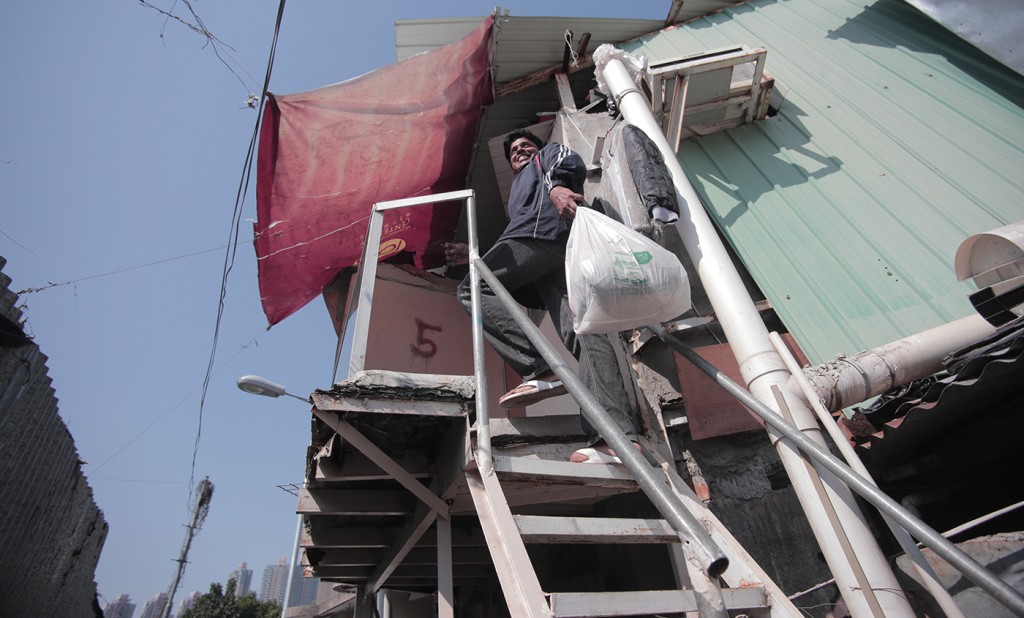
Judicial Review favorable for dependent visas
Jan 28th, 2015 | Legal, VF Opinion | Comment
As many refugee spouses face “Non-Decisions” by Immigration on their dependent visa applications, a process that can drag on for years with the repeated submission of the same documents, those lucky ones who receive a reply may find it unsatisfactory.
Particularly, the following judgment seems to shine light on a depraved problem. What weight is given by Immigration to the applicant’s criminal record and family circumstances when considering a visa that may change not only the life of the sponsored refugee, but also that of resident children who might grow up without the love and support of a parent considered undesirable by the state?
How many such cases do refugees need to win before proper policies give certainty to an abusive aspect of the asylum process?
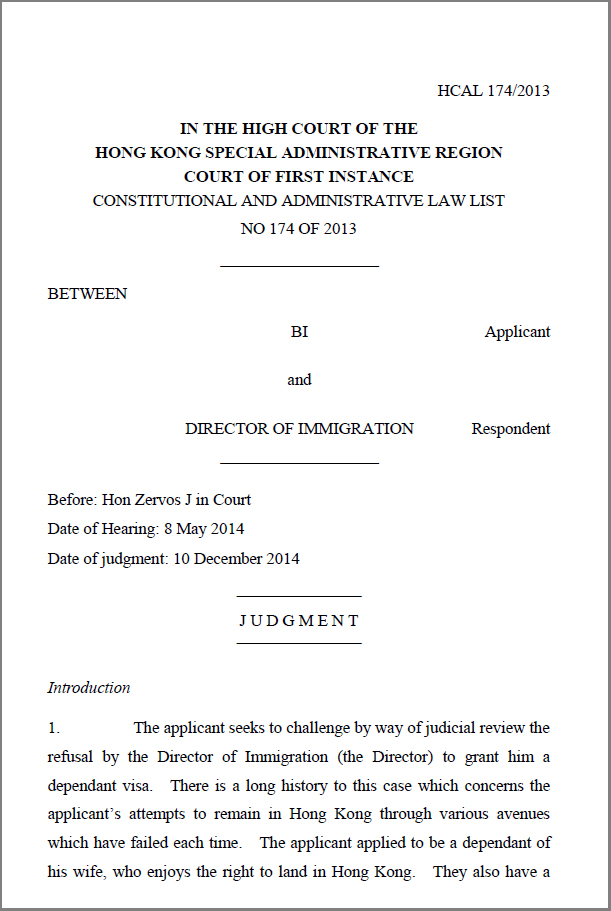
Mandated refugees and screened-in torture claimants have no right to work in Hong Kong
Jan 27th, 2015 | Immigration, Legal, Media | Comment
Are dependent visas reasonably denied?
Jan 27th, 2015 | Crime, Immigration, Legal, VF Opinion | Comment
After seeking asylum in Hong Kong, one of the first things refugees learn from peers is that they will never be allowed to integrate and earn a living (including successful non-refoulement claimants) unless they marry a resident and successfully obtain a dependent visa – which requires withdrawing protection claims before the sticker is affixed to a passport.
Immigration guidelines indicate that dependent visas generally take three months to process, although refugees experience a different treatment that, when successful, is likely to take two years and otherwise drags on for many years with litigation (which doesn’t come free) rising as the only option to break the stalemate, if official obduracy can be described as such.
A refugee blogger recently described immigration strategies as perceived by his community, “They know that certain people will find a way that is convenient for the government – though unfair for refugees – like marriage, moving to another country, smuggling out and closing asylum claims through so-called ‘voluntary departures’.”
The stigmatization of individuals who sought sanctuary in Asia’s World City is so profound that even years of love with local citizens cannot wash it away. Not even when beautiful children are living proof that marriages are real and a genuine family exists behind the paperwork that, in the mind of immigration officers, might have thrown a monkey wrench into removal proceedings.
A pattern emerges when scores of dependent visas are denied or delayed for applicants who were so unfortunate as to seek asylum before falling in love. It is unrealistic to expect that authorities publish statistics on failed application, which in our view should include applications stalled by ‘non decisions’ for over one year. The data would speak volumes about the bias treatment of refugee spouses.
It is regrettable that Immigration consistently fails applicants who committed mild offenses such as working, despite work being absolutely necessary for refugees to make ends meet since they do not receive adequate welfare assistance and belong to ethnic groups that are largely shunned by charities as being less deserving of their limited resources.
Working illegally is a matter of survival for most refugees, but a criminal conviction will jeopardize the fate of a family – including the future of resident children – even if a struggling refugee was arrested years before for selling bootlegged software or fake leather bags to keep a roof over his head or supplement meager food rations. Where is the fairness of laws that constrain pathways of survival only to mercilessly penalize those with no alternative but to stray?
A few examples illustrate the predicament faced by dozens of refugees:
Case one: a refugee since 2005, married in 2013 and was denied a dependent visa for reason of a life-time deportation order triggered by a 2007 offense “to export goods to which a forged trademark was applied” [NB: copy goods] at a time before he knew about refugee welfare assistance.
Case two: a refugee since 2005, married in 2011 and has a son. He was convicted of working, though he pleaded not guilty as he was visiting a friend at his place of employment. He was nonetheless convicted to four months and marked as ‘persona non grata’.
Case three: a long time refugee since 2002 married in 2008 and has a son. This family has been waiting for a dependent visa for 6 years. Arrested for false representation to an immigration officers after arriving in Hong Kong with a dodgy passport, he was served a deportation order that he gets suspended every year by the office of the Chief Executive. He has no chance of being granted a visa until said order is quashed.
Vision First takes the view that refugees must not be punished for struggling to survive in a hostile environment arguably designed to push them into criminality. On Sunday a refugee was arrested for being in possession of 5 mobile phone chargers (worth 300$) which he is accused of intending to trade, presumably to support his wife and child. Wouldn’t police resources be better allocated pursuing more substantial criminal activity?
It is further a travesty of justice that resident spouses and children are denied a legitimate future. There is a need for a moratorium on immigration rules the stringent application of which will never persuade fathers to abandon their loved ones.
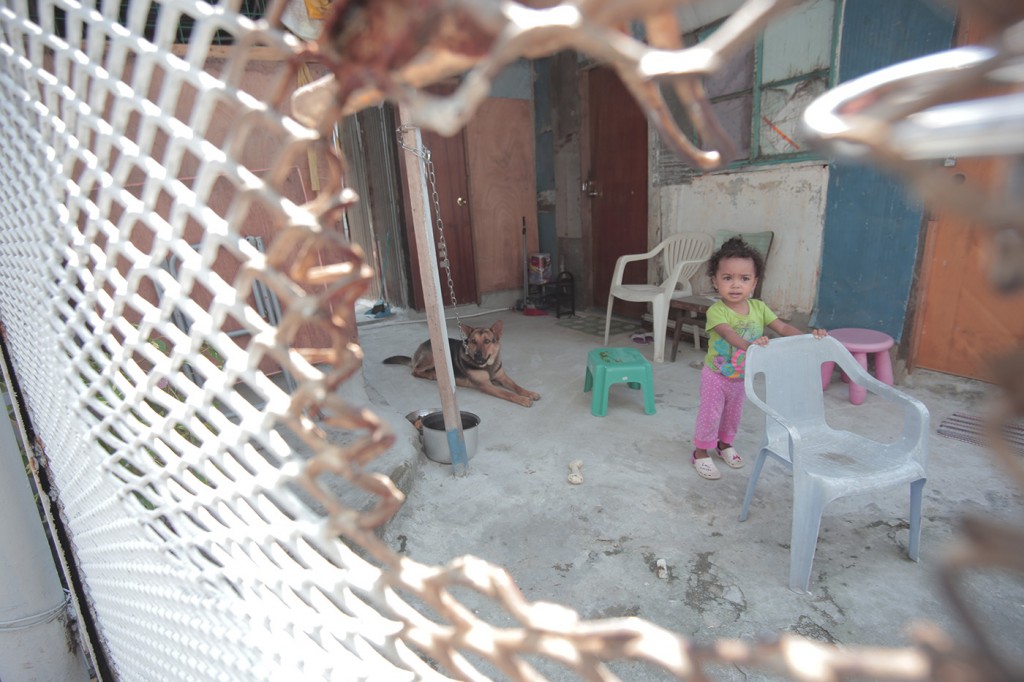
Lone Ranger battles asylum failures in court
Jan 3rd, 2015 | Legal, VF Opinion, Welfare | Comment
The emergence of the refugee activist is contagious! Over 2013 and 2014, Mr. Akhter Rana Shahid filed complaints against several government departments and the ISS-HK for these bodies were argued to have failed to protect him. The complaints were dismissed.
We do like to take this opportunity to contribute our views as the matters raised by the plaintiff are, we believe, of public concern. Although we haven’t had the pleasure of meeting Mr. Akhter Rana Shahid, we think the grievances dismissed by the Court of First Instance in HCMP 3094/2013 may not be as frivolous and vexatious as they certainly appear at first sight to unconcerned readers.
The following considerations should be made.
First, while the plaintiff filed separate complaints against the Immigration Department, Police, Social Welfare Department, Legal Aid and the ISS-HK, there seems to be a common thread that unites them: the lack of a comprehensive asylum procedure that causes refugees intolerable hardship. Some failures were listed by the seven originating summons, interestingly against some of the agencies at the forefront of the government attempt to contain, or simply manage, the asylum ‘problem’. In this vein, we are left with the uncomfortable feeling that the confused and scattered issuance of summons, as well as the unclear arguments put forward by the plaintiff, alleging circumstances that seem to miss the point though sound plausible, may be explained by the lack of legal representation. A paucity of Legal Aid approvals and the rarity of pro-bono support are issues that undeniably thwart refugees who resort to legal proceedings in person, hoping to find a sympathetic ear and justice. It is significant that on the one occasion that Mr. Shahid had legal representation he was awarded compensation for unlawful detention.
Second, in the burglary case, it is unclear how the investigation unfolded, but two issues seem clear. The plaintiff alleges he found a burglar in his home, and the burglar was surprisingly his landlord. Whether this person was in cahoots with ISS-HK is debatable. What seems plausible is the fact that, for political reasons, refugees are placed in a state of vulnerability that is implemented by ISS-HK, thereby drawing upon this agency the ire of refugees, with a predictable eruption of problems and confrontations. Further, the ISS-HK services, or lack of, can be said to cause innumerable disputes between refugees and bottom-tier landlords. It is accepted that refugees are compelled to settle in certain rooms, and at certain restrictive conditions, due to insufficient rent assistant. It is not new to us that some landlords take justice into their own hands and, if rent is not on time and in full, think nothing of threaten tenants, cutting electricity and water, locking them out of their homes and even stealing from them, safe in the knowledge that refugees (women in particular) often hold back from reporting such criminal behaviour to the police. When reports are made, police intervention generally dismiss such incidents as ‘personal matters’.
Third, the background situation raises grave concerns about the well-known problem of the welfare assistance to refugees being wholly inadequate. The glaring shortcoming is predicated on the misguided rationale that such benefits are indeed not welfare, but humanitarian assistance provided in-kind and only in a measure sufficient to prevent destitution, while discourage hopeful asylum seekers from coming to Hong Kong. The logic of this political decision is challenged by the evidence of widespread suffering across the refugee community, hardly justifiable by deterrent objectives. Despite a shameful reality plain for anyone to observe, inhumane policies and practices persist. Further, the ISS-HK and SWD assistance package is rarely vigorously challenged in court where the judiciary commonly takes the view of its sufficiency, as in the numerous cases of refugees convicted for taking up employment merely to pay rent and buy food. One can only query why and to whose advantage?
Fourth, while it is the duty of the Legal Aid Department to assess the merits of each application and prevent the waste of public funds in frivolous and vexatious claims, it is doubtful that Mr. Shahid was in a position to present full particulars and evidence in a professional manner without the assistance of a lawyer. We are not told the details, but a few questions come to mind: Did the police readily furnish records of the burglary investigation? And did ISS-HK provide details of partial rent payments that precipitated the plaintiff’s relationship with his landlord? Logic presumes that, if refugees are to be banned from working, then Hong Kong government should arrange accommodation and, if necessary, pay rent in full. Did the plaintiff make this critical connection clear to Legal Aid? Can refugees acting in person in court be reasonably expected to grasp legal requirements and procedures? That is, should they know how to present cases by themselves against well represented defendants? Can anyone in such a fraught state of mind (i.e. feeling persecuted at home and in HK) produce a compelling case to take on the Justice Department alone?
Ultimately, we believe that something important should be learned from Mr. Shahid’s troubles. His legal actions, though defeated, make public the desperation of a refugee who attempted in several ways to find a place in society and relied consistently on the authorities to be treated fairly. Each time he was frustrated by the lack of justice, actual or perceived, that he believed he deserved. It seems obvious that there is a mismatch between his reasonable expectations of living in a fair and just society, developed by any standards, and the reality of finding himself in a place that intentionally dehumanized him. Government deterrent policies against asylum seekers might be effective in disillusioning present asylum seekers, but why do asylum seekers keep coming and arrive with little or no knowledge of actual conditions? In such light, are the prevailing deterrent measures failing? Or is the deterrent rationale simply a measure to punish those already seeking asylum in Hong Kong, rather than discouraging others from making the journey?
The broken window trap
Nov 1st, 2013 | Crime, Legal, VF Opinion, Welfare | Comment
Recent news of South Asians, supposedly torture claimants, robbing a mother and daughter understandably sparked distrust of and reprobation towards refugees in general, whose poverty and lack of integration mark exclusion from society.
While the violent crime must be condemned and punished, one should be reminded that poverty is inflicted on asylum seekers by unjust policies aimed at preventing social inclusion. The consequences are alienation and detachment from a community that rejected from the start.
Further, it is well known that when people are institutionally prevented from achieving a normal life, depending on their will to escape their circumstances and available opportunities, they may resort to crimes to survive. This direct, causal connection is always worthy of attention.
There is a hint of deception when access to asylum is offered without access to adequate support. Weaker individuals will be tempted by crime, when alternative and realistic means of survival are denied by a failed support system that is less than humanitarian.
It is now recognized that rent allowance and food provisions by SWD-ISS are insufficient. It is outrageous that refugees are plunged into destitution by the very program that aimed to prevent it. From rent to groceries, from electricity bills to cooking gas, from travel cost to phone bills … nothing has changed. Are the covert objectives sinister?
Refugees face dire circumstances that endanger their survival. It is shameful that they are left in destitution only to be condemned when falling to crime – and it should be noted that engaging in unlawful work is a crime. Whether refugees work, steal or sell drugs, they become criminals. Paradoxically, they received lighter sentences selling drugs and stealing, than taking up jobs!
Could this be asylum rejection by entrapment? The situation is not unlike parking expensive cars in ghettos to lure opportunistic thieves. In the “Broken Window Trap”, police place a mobile phone inside a smashed window to make an easy arrest. It’s an effective, but highly questionable sting.
When policies drive persons to commit offenses that they would otherwise have been unlikely to commit – entrapment becomes a possible defense against criminal liability. There is no mitigation for robbing a mother and daughter, yet Hong Kong’s asylum policy is wrought with ethical concerns.
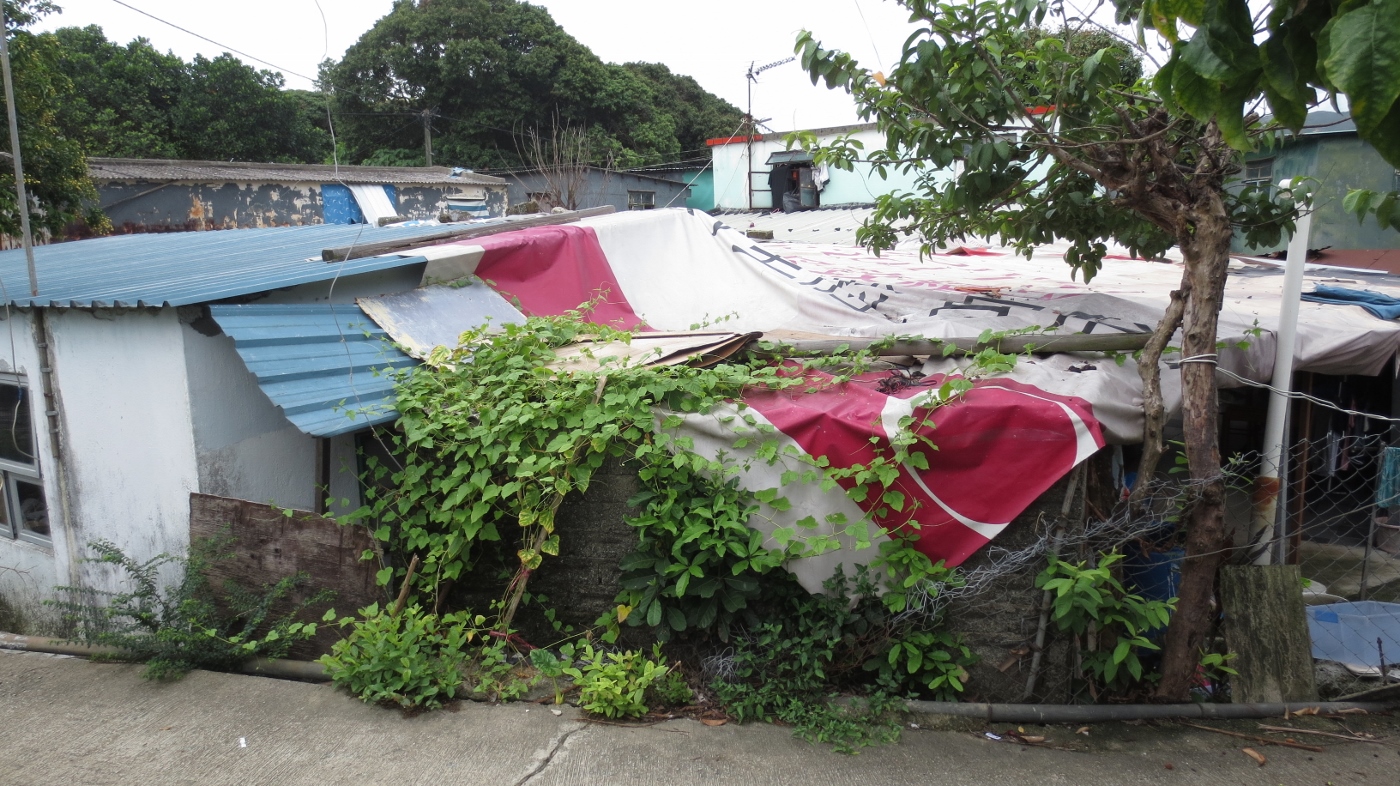
Hong Kong should help those in refugee limbo
Apr 6th, 2013 | Immigration, Legal, Media, Welfare | Comment


